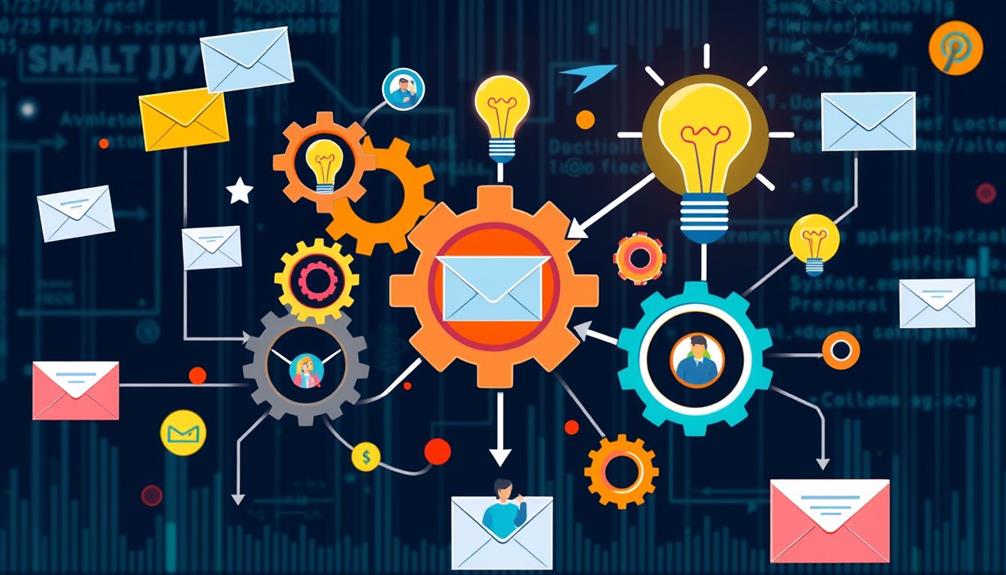We all know the age-old saying that ‘Email is dead.’ But before we dismiss it completely, let’s take a moment to reconsider that notion.
In today’s digital landscape, email marketing remains a crucial tool for small businesses. It allows us to connect with our audience in a personal and direct way, driving engagement and ultimately, sales.
But why exactly is email marketing so important for small businesses? Well, that’s what we’re about to uncover.
Key Takeaways
- Email marketing has a high engagement rate, with 91% of US adults welcoming promotional emails from companies they do business with.
- Email marketing is almost 40 times more effective than Facebook and Twitter combined in acquiring new customers.
- The return on investment for email marketing is about $36 for every $1 spent.
- Effective email marketing strategies drive business growth and success.
Importance of Email Marketing
Email marketing plays a crucial role in today’s digital landscape, offering small businesses a powerful and cost-effective way to connect with their audience. The importance of email marketing can’t be overstated. It has a high engagement rate, with 91% of US adults welcoming promotional emails from companies they do business with. This presents a golden opportunity for small businesses to build and maintain relationships with their customers.
Moreover, it’s almost 40 times more effective than Facebook and Twitter combined in acquiring new customers. This highlights the immense potential of email marketing for small businesses. The ability to deliver personalized and relevant content directly to a customer’s inbox is a game-changer. It not only drives customer acquisition but also nurtures and retains existing ones.
The return on investment for email marketing is also staggering, averaging about $36 for every $1 spent. This makes it a vital tool for small businesses looking to drive sales and grow their customer base. Harnessing the power of email marketing through targeted campaigns can yield significant results for small businesses.
Benefits for Small Businesses

Having established the significant impact of email marketing in nurturing customer relationships and driving sales, let’s now explore the manifold benefits it offers to small businesses. When it comes to marketing for small businesses, email marketing automation tools provide several advantages, making it an important aspect of any small business owner’s strategy.
Here are some of the key benefits:
- Building Strong Customer Relationships: Through targeted and personalized campaigns, small businesses can connect with their customers on a more personal level, fostering loyalty and trust.
- Boosting Brand Awareness: Emails provide a direct line to customers, allowing small businesses to consistently reinforce their brand image, voice, and style, ultimately increasing brand recognition and recall.
- Driving Cost-Effective Results: With a high return on investment, email marketing allows small businesses to achieve multiple marketing objectives without straining their budget, making it a valuable and cost-efficient tool.
Effective Email Marketing Strategies
As small business owners, we understand the importance of implementing effective email marketing strategies to engage our audience and drive business growth. Personalization is key to capturing the attention of our target audience. By creating tailored content, we can increase email open rates by as much as 23%. This means understanding our subscribers and delivering content that’s relevant to their needs and interests. Additionally, leveraging data about our subscribers allows for targeted campaigns, ensuring that our messages resonate with the right people.
The benefits of effective email marketing strategies are substantial. Email marketing has the highest ROI of all forms of marketing, averaging about $36 in return for every $1 spent. Automation is also a crucial component, saving us time and money as business owners. By utilizing automation, we can schedule emails, segment our audience, and trigger personalized responses based on customer actions.
Tracking analytics is another vital aspect of effective email marketing. It helps us determine what resonates with our audience, enabling us to refine our content and strategies for better engagement. Ultimately, effective email marketing strategies build brand recognition and foster strong customer relationships, driving business growth and success.
Maximizing Email Marketing ROI

To maximize the return on investment from email marketing, small business owners can implement various techniques and strategies to enhance the effectiveness of their campaigns.
By incorporating A/B testing, businesses can determine which elements resonate best with their audience, leading to more impactful and engaging content.
Additionally, utilizing a double opt-in process not only ensures a higher quality subscriber list but also fosters a sense of commitment and interest from recipients.
Furthermore, leveraging data about subscribers allows for highly targeted campaigns, delivering personalized content that resonates with individual recipients and drives increased engagement.
Measuring Email Marketing Success
After implementing A/B testing, utilizing a double opt-in process, and leveraging subscriber data to enhance the effectiveness of our email marketing campaigns, the next crucial step is measuring email marketing success to gauge the impact of our efforts.
Small businesses can measure the success of their email marketing campaigns by tracking open rates and click-through rates to gauge engagement and effectiveness. Utilizing email marketing analytics is vital for assessing conversion rates and return on investment, helping to measure the impact of campaigns on sales and revenue.
Monitoring subscriber growth and engagement metrics provides insights into the development of the email list and the level of customer interaction. Additionally, implementing A/B testing allows for the comparison of different email components and strategies, enabling optimization based on performance data.
It’s also important to evaluate spam complaints and unsubscribe rates to gauge the relevance and value of the email content to subscribers. By measuring these key metrics, small businesses can determine the effectiveness of their email marketing strategy in driving website traffic, increasing brand awareness, and boosting sales through a compelling marketing message.
Frequently Asked Questions
Do Small Businesses Need Email Marketing?
Yes, small businesses absolutely need email marketing.
It’s a crucial tool for reaching and engaging with customers.
It allows us to build strong relationships, drive sales, and measure our success.
With its high open rates and cost efficiency, email marketing is a powerful way to acquire and retain customers.
We can offer exclusive perks and communicate effectively, fostering loyalty and excitement.
It’s an essential part of our marketing strategy.
How Does Email Marketing Benefit a Business?
Email marketing benefits a business in several ways. First, it provides a direct line to customers, allowing businesses to communicate directly with their target audience. This can help build brand loyalty and trust.
Secondly, email marketing drives engagement. By sending relevant and timely content to subscribers, businesses can encourage recipients to take action, such as making a purchase, visiting a website, or attending an event.
Thirdly, email marketing nurtures relationships. By consistently delivering valuable content to subscribers, businesses can build strong relationships with their audience, leading to increased customer loyalty and repeat business.
Additionally, email marketing is a cost-effective way to reach a wider audience. Compared to traditional marketing methods, such as print advertising or direct mail, email marketing is much more affordable and accessible to businesses of all sizes.
Furthermore, email marketing delivers an impressive return on investment (ROI). With the ability to track open rates, click-through rates, and conversions, businesses can measure the success of their email campaigns and make data-driven decisions to optimize their marketing efforts.
Moreover, email marketing offers personalization opportunities. By segmenting subscribers based on factors like demographics, interests, or past purchases, businesses can send tailored content that is more likely to resonate with recipients. This leads to increased open rates and improved customer engagement.
Lastly, email marketing can be integrated with other marketing channels, such as social media. By coordinating efforts across different platforms, businesses can create a comprehensive marketing approach that reaches and engages customers in multiple ways.
How Important Is Email Marketing?
Email marketing is crucial for boosting customer engagement, driving sales, and fostering brand loyalty. It allows us to reach a wide audience, personalize messages, and track campaign performance.
By sending targeted content, we can nurture leads and convert them into customers. With the right strategy, we can build strong relationships with our audience and keep our brand top of mind.
Email marketing is a powerful tool for small businesses to achieve growth and success.
How Do You Use Email Marketing to Boost Your Small Business?
We use email marketing to boost our small business by crafting compelling content that speaks directly to our audience’s needs and interests.
By segmenting our email list and personalizing our messages, we ensure that our subscribers receive relevant and valuable information.
We also leverage automation to send targeted campaigns at the right time.
This approach helps us nurture leads, drive sales, and build lasting relationships with our customers.
Conclusion
In conclusion, email marketing is crucial for small businesses to stay connected with their customers and drive results.
Did you know that 59% of consumers say marketing emails influence their purchase decisions? That’s a powerful statistic that shows the impact of email marketing on consumer behavior.
By implementing effective email marketing strategies, small businesses can maximize their ROI and measure their success, ultimately driving growth and success.









